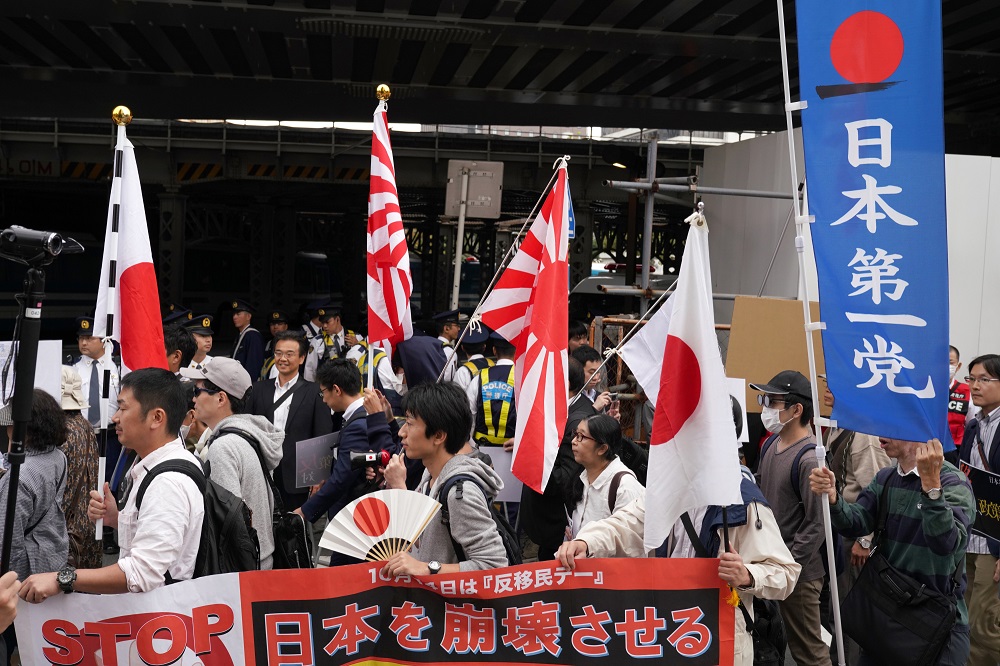
Misha Awad, a student at the Inter-University Center for Japanese Language Studies in Yokohama, says the feeling of finally being able to arrive in Japan for her studies was “kind of just mind-blowing.” | CHRIS RUSSELL
or Misha Awad, the process of boarding a plane to Japan and then going through immigration brought with it a range of emotions — shock, nervousness, bureaucracy-induced tedium and even amusement.
While moving to a new country is a major step in anyone’s life, Awad’s case had an extra layer to it, as it was also the culmination of a long wait to return to Japan.
A student at the Inter-University Center for Japanese Language Studies (IUC) in Yokohama, she and many fellow members of her program were finally able to enter the country in mid-March, having previously had their hopes dashed at the end of November, when their permission to enter Japan was canceled just days before they were supposed to fly due to tightened restrictions following the discovery of the omicron variant.
“Knowing for sure I had made it to the gates, I don’t need any of these papers (for immigration) anymore, I’m actually here — that was kind of just mind-blowing,” she said.
Following the easing of Japan’s strict border controls on March 1, which have been in place for most of the pandemic, at least some foreign students have been able to arrive in time for Friday’s start of the academic year. For universities, researchers and students, that’s a welcome and long-overdue change after a prolonged period of waiting and remote learning and research that came at great cost.
For fellow IUC student Cassidy Charles, her arrival brought feelings of relief, not least because of a last-minute scare after her domestic connecting flight was canceled due to bad weather, meaning she couldn’t get on the actual plane to Japan. While she was able to fly out to her new home the next day, the cancellation set off a scramble to secure a new seat and get tested for COVID-19 again — all the while contending with the fear that this setback might scupper her chance to enter Japan.
“When I was able to get my bags and leave, I was like, ‘Oh my god, I did it. I can go to sleep now. Like I don’t care what else happens, like the world could explode right now, but I have done it, I’m done,’” she said.
In total, 31 IUC students arrived in March, joining the 13 who were already in Japan, while seven remained outside the country of their own volition. For those who did travel, bureaucratic confusion was a common occurrence, with consular or embassy officials often misunderstanding the students’ situation and the documents they needed — incidents that were fortunately cleared up quickly after the IUC reached out to its Foreign Ministry contacts.
IUC’s fourth and final term began Monday, and due to ongoing COVID-19 measures, online learning will continue even for those in Japan. The IUC has been satisfied with the results of that arrangement, even when students have been stuck outside the country.
“We did follow up on students last year during the pandemic. We compared their test scores in a variety of areas at different stages in the program with the test scores from previous cohorts and came up with fairly concrete indices that showed that, well, they didn’t do 100% as well as students in the past, but they did like 80% as well,” said Bruce Batten, the resident director of the IUC. “So even online, I think things went pretty well.”
Nonetheless, the center is planning in-person extracurricular activities for students, and Batten stresses that immersion in Japanese makes a real difference, particularly in terms of having the language stick.
Away from class, students have been able to re-engage with their Japan connections. Awad, who has had two previous stints in Japan, has finally reunited with her partner and thrown herself back into a number of community-driven projects she is involved with. Charles, meanwhile, has been able to see the family she stayed with in Hokkaido when she was 15 and is particularly close to — the wait to enter the country saw her miss the birth of two girls in the family.
“Just being in Hokkaido being able to see my family again and see my nieces, that was the best part (of coming back),” said Charles. “It’s been great to be reconnecting with people.”






